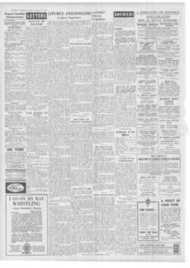Page 3, 22nd January 1943
Page 3

Report an error
Noticed an error on this page?If you've noticed an error in this article please click here to report it.
Tags
Share
Related articles
Spain : Another Resurrection Pie
A Reliable Book On Spain
Destroying The Black Legend Of Spain
Protestants In Spain
Spain
"IT HAD TO BE WRITTEN"
Spain. By Salvador de Medariaga. (Jonathan Cape. 25s.)
Reviewed by ARTHUR F. LOVEDAY
THIS notable history must have the effect of blowing sky-high
the myths created around the causes and history of the Spanish Civil War by Left-Wing publicists in this country. As the author says in his preface, " It had to be written."
His book shows that Don Salvador de Madariaga was, and still is, a convinced Republican. On the overthrow of the Spanish monarchy he ieft his professorship at Oxford and became successively Ambassador of the Republic in Washington and Paris, and then Represenrarive on the Ceuncii end Assembly of the League of Nations. He was a man or the Left and a friend of most of the protagonists of the Repel-therm regime, but, where the facts demand it, he does not hesitate to criticise them, their policies and their actions with a very great severity. Ile devotes a far smaller criticism to the protagonists of the cause of Gencial Franco, to which he is opposed by temperament and ideas. This is ire deed an objectivity such as he claims, SPAIN is divided into two books. The first was originally written in 1930 and has been revised to form part of the present book. It cornprises historical studies of the Land, the People, the Monarchy, the Dictatorship, and the immediate pre-war history of Spain. It ahm includes chapters on the Church, thesArmy, and 'the Catalan and Basque questions. The historical qualities of the ea her make a review of his first book unnecessary, but it provides the essence,' background for the Civil War and the events that led to it, without which it is impossible to comprehend the
meaning of that bloody struggle. It is here that most of the writers an the Civil War settled, for without a knowledge of the background, which they had not got, they were rudderless and incapable of either seeing or painting an accurate picture.
The second book begins with the fall of the monarchy. for which evidently Seitor de Madariaga has no [egrets, and the establishment of the second Spanish Repeblic He devotes a series of chapters to describe the troublous political dissensions during the Presidency of Alcala ZaMOira, during which the different tendencies of Right, Centre and Left strove against each other lot control and the revolutionary impetus of the Communists and Anarchists gathered force.
He refers in footnotes Co the early Comintern activities in Spain previous to J930. He describes how Largo Calaallero was leading fiery Socialist youths towards. the proletarian revolution," arid again, how Alvaiez del Vayo, Communist and agent of the Comintern, and Araquistain a Socialist. " turned Largo Caballeros head and made him believe lie was predestined to be the Spanish Lenin."
He condemns the 1934 veiled iising in Asturias and Barcelona, saying that by them " the Left lost every shred of moral authority to condemn the rebellion of 1936."
The author emphasises the wholly Spanish origins at the conflict. Though he denies the direct responsibility of either Russia. Italy er Germany in causing the Civil War, he describes how " the !tripes raised in Lenin by Spain as a second Russia in Europe are a cornrow-inlet:roof Bolshevik Mereture . . . the chief agent .for that policy in Spain was to be Alvarez del
. . it was Moscow that had dubbed Senor Largo Caballero the Spanish Lone."
FOREIGN intervention, non-interven tion and the chaos and graft in Repuhlican Spain are adequately described. Small space, however, is given to the military campaigns and the persecution or Christianity. while the assassinations. alrocilics and Chcka prisons are hardly referred to, which is strange, as they were the chief illustration of the Republicans' incapacity to govern. The war which began on July 17. 1936, was. says the author. a purely natipnal affair until November, when the International brigades unexpectedly appeared in Madrid From then on foreign influence increased on both sides until on the Republican side the war and policy wele practically directed by the Russian-German staff and the Cemmunist Alvarez del Vayo and Negrin, The latter " exported ninety million pounds or Spain's gold to Russia, where it disappeared as far as Spain was concerned.
S"OR de Madaria3a denies strongly . that the Nationalists won merely because they had the help of Germany and Italy.
He is unsympathetic to, and critical of, General Franco's internal policies, but he gives him credit for being " a shrewd and patient diplomat in foreign affairs." To a foreign student of Spanish affairs, he would appear less titan fair to General Franco, in attributing to him personal motives, and to the Army, which has rescued Spain from anarchy twice in the present generation.
The novelesque but too little-krrown story of the exiled Republican politicians, their internecine quarrels and the enormous holey which Ds. Negrin removed from Spaie . is told in the chapter headed " Exodus."
In his last chripter the author leaves history and peeps re the future, outlining the geographical, economical and cultural relations between Spain and England. and brings out the outstanding importence of, Anglo-Spanish friendship for both countries.
blog comments powered by Disqus







